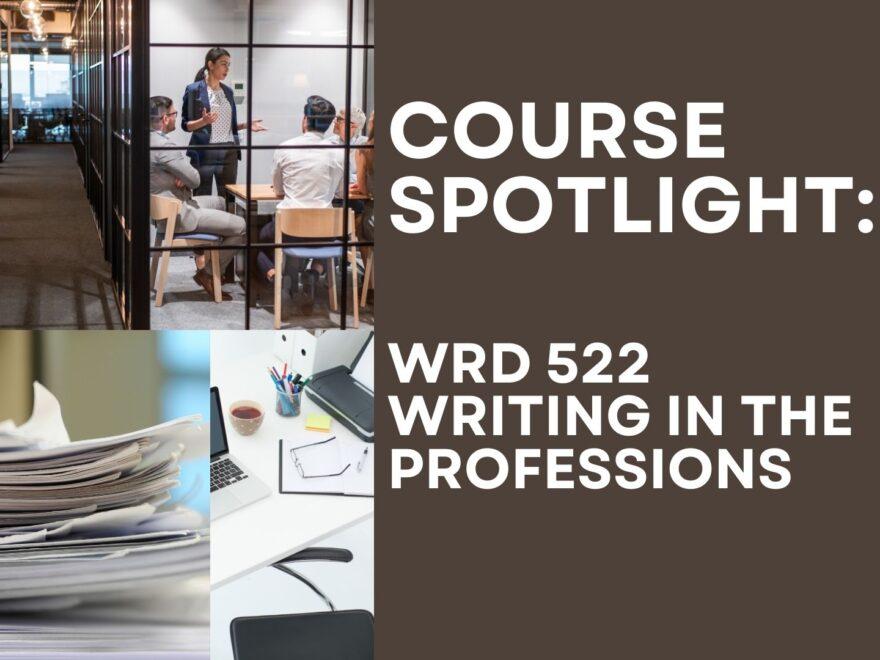Workplace writing is a critical skill that professionals use every day, but what exactly is it, and how can students learn it? In Spring Quarter 2025, Dr. Timothy Elliott seeks to answer these questions in WRD 522 Writing in the Professions. Read on to learn more about what to expect in this graduate level course and see why you should enroll.
Course Goals and Learning Outcomes
WRD 522 Writing in the Professions seeks to define workplace writing while also equipping students with the tools to do it effectively. Instead of just discussing theories, Dr. Elliott will bring in industry professionals nearly every week to share firsthand insights into how writing functions in various work environments. Students will not only learn about workplace writing but also practice it, refining their skills in real-world genres and contexts.
By the end of the course, students will have a clearer understanding of workplace writing and how it varies across industries. More importantly, they’ll develop an understanding of workplace writing tailored to their professional interests, whether they aim to work in nonprofits, education, corporate settings, or any other field requiring strong writing skills.
Dr. Elliott’s Spark for Teaching This Subject
Dr. Elliott shared that he has had a strong interest in teaching workplace writing ever since he started teaching at DePaul. Having taught similar courses at the undergraduate level, this course in particular excites him because it integrates theoretical components with practical application. Students will be engaging with contemporary workplace writing theory, particularly long-form research studies that examine how professionals across different industries approach writing. This balance between theory and practice makes the course dynamic, engaging, and relevant.
This balance between theory and practice makes the course dynamic, engaging, and relevant.
Course Structure
The course is structured around weekly themes, each focusing on different workplace writing contexts such as nonprofit writing, writing in education, and communication in corporate environments. Dr. Elliott will scaffold assignments, beginning with foundational tasks like writing pitch emails and moving toward more complex projects like formal proposals. By the end of the course, students will complete a final report based on their research and interviews about workplace writing in a specific field.
To complement the readings and discussions, the class will welcome guest speakers who will provide real-world insights into their professional writing experiences. This approach ensures that students learn not just from academic texts but also from those actively engaged in workplace communication.
Major Projects and Assignments
The backbone of this course is workplace genres. Students will:
- Develop proposals that examine workplace writing in a specific field.
- Conduct interviews with professionals to understand how writing functions in their jobs.
- Learn coding techniques to analyze qualitative data from their research.
- Write a final report that synthesizes their findings about workplace writing in a particular industry.
This structure allows students to explore writing in their current workplaces or fields they aspire to enter, making the course highly career-focused and applicable to their lives.
What Else Should Students Know About This Course?
This course is designed as a “choose your own adventure” experience. While there is a clear framework, students have the flexibility to focus on writing in industries that interest them most. The foundation of the course has been developed through years of experience teaching workplace writing, but the customization aspect ensures that each student gets the most out of the experience.
This course is designed as a “choose your own adventure” experience.
Throughout the quarter, students will analyze patterns in professional writing, explore qualitative research methods, and engage with the latest research studies published in the past decade. Additionally, students will take a broad look at writing across disciplines, not just within specific organizations, to understand how workplace communication functions on a larger scale.
While resume writing and portfolio development won’t be the main focus, they will be discussed briefly to ensure students understand how their new writing skills apply to job searches and career advancement. One unique aspect of this course compared to undergraduate versions is its emphasis on application over definition—students will engage more deeply with rhetorical theories and move at a faster pace, balancing theoretical grounding with practical career preparation.
The Takeaway
Ultimately, this course will help students develop workplace writing skills that are not only relevant but essential for their future careers. Whether they’re interested in nonprofit writing, academic communication, corporate strategy, or another professional writing context, they’ll gain hands-on experience and direct insights from industry professionals. By the end of the quarter, students will have a deeper understanding of workplace writing that showcases their ability to navigate professional communication effectively.
Interested in enrolling? Add WRD 522 Writing in the Professions to your course cart now! To learn more about other courses offered by WRD, be sure to check out the latest Course Spotlights here on the WRD Blog.
